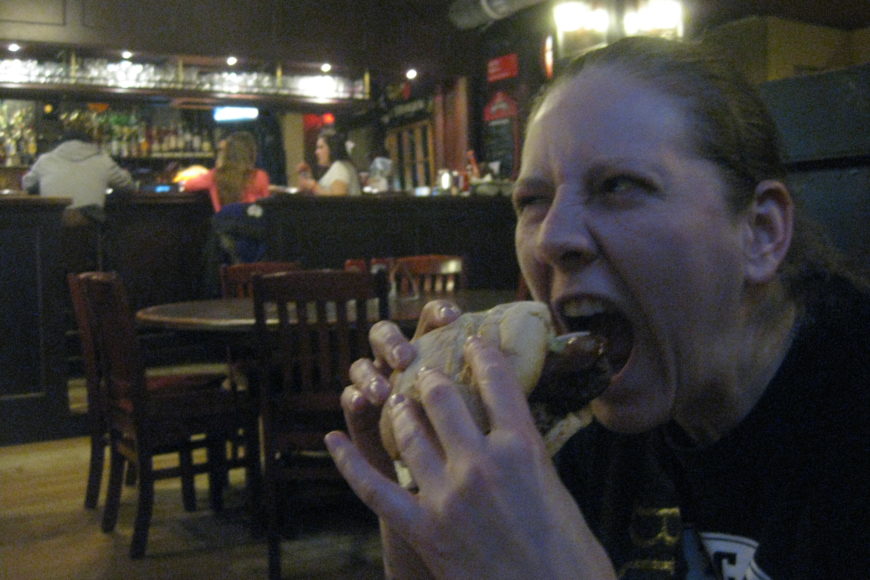
Beyond Burger Week: Why I No Longer Participate in Burger Week
*Update 2023: Over the last two years, the long-term effects of the pandemic are becoming more clear. We are still at risk of the virus (which is now easy to dismiss, but as someone who has had it twice, I can tell you that it’s not just a cold), but we are now also facing crippling inflation and wage stagnation. Between housing costs and groceries, and armed officers guarding grocery stores, I’m not sure how a lot of us are getting by.
(Are you still eating $17 hamburgers?)
I think, more than ever, Burger Week (a.k.a. “Burger Bash”) is missing the mark. Binging on expensive hamburgers in the name of “charity” (if that is your motive) is completely and utterly tone deaf.
Plus, The Coast was sold to B.C.-based company, Overstory Media Group, last year. I had questioned the relevance of The Coast in 2021 and I’m really questioning it now.
“The Coast, founded in 1993, cited rising operation costs, a struggle producing online content and general pandemic-related difficulties as the reason for the sale.
Overstory Media Group has been acquiring local media groups and publications since its founding in 2021. It was founded by Mohamed and Andrew Wilkinson with the goal of acquiring local publications and building a network of media groups.” (From CBC).
So I will repeat what I often say: if you want to eat hamburgers, eat hamburgers. If you want to support local restaurants at a slow time of year, please go show your favourite restaurant some love. And if you want to help less fortunate Nova Scotians during these trying times, please donate money to FEED Nova Scotia:
DONATE
Now, back to you the original post.
As many of you know, I have championed Burger Week since its inception in 2013, and I was even one of the first Burger Ambassadors. A couple of years ago, I wrote a blog post defending Burger Week against new criticisms that had risen alongside, and due in part, to the sheer popularity of the event. But it is a different world now. Trends rise and fall, we learn and change, and the pandemic has opened our eyes to what we truly value. This shift in perspective has made us realize what is important to us, what can be discarded, and what has been slowing us down.

What does this have to do with Burger Week?
We are in an era of transition. The last time there was a shift in the culinary collective consciousness was in the years after the recession of 2008. Restaurants had to pivot from fine dining to elevated comfort food, and this has led to the upscale casual scene that still currently dominates the dining landscape.
It was also the dawning of the age of the gourmet hamburger. The gourmet hamburger was, at its best, a simple preparation using the highest quality ingredients. This is exemplified by Ace Burger’s Deluxe, featuring Getaway Farms grass-fed beef, P.E.I. cheddar, Brothers’ back bacon, frisee lettuce, frizzled onions, pickle and Dijonnaise on a challah bun. It may sound basic enough now, but at the time it stuck out strikingly against a backdrop of frozen Sysco pucks and the ho-hum of backyard condiments.
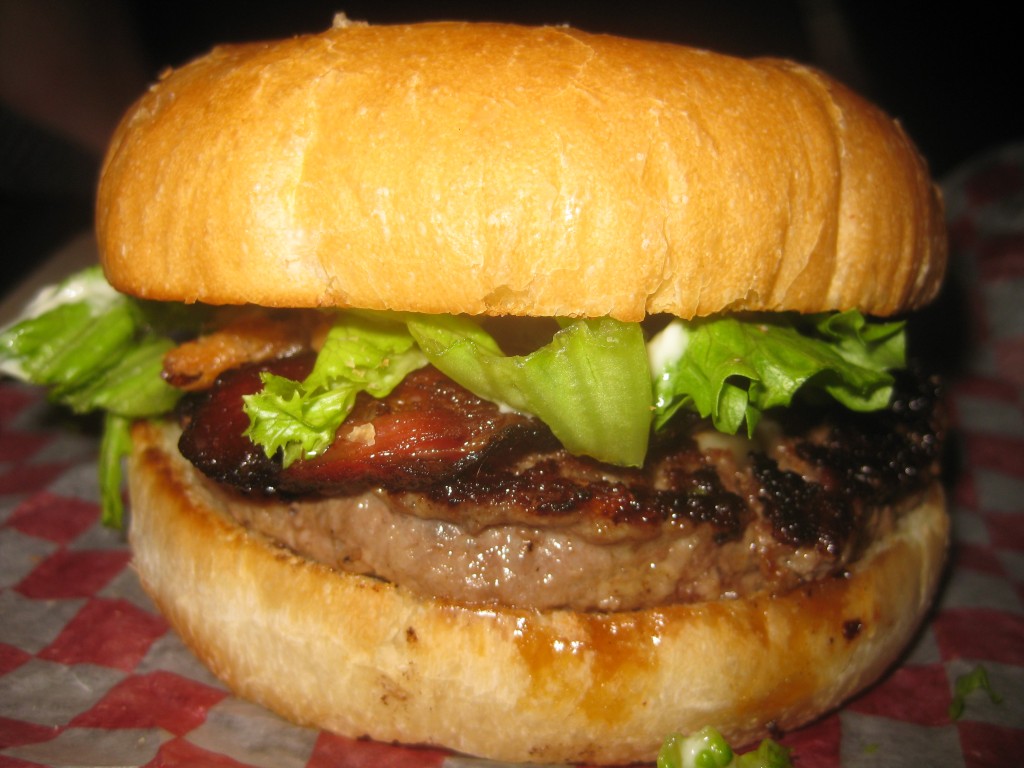
At its worst, the gourmet hamburger was lipstick on a pig (or cow, as the case may be): overly complicated, with powerful flavours disguising mediocrity.
But people were hungry for it, and restaurants were eager to cash in on it.
You need to understand this context in order to understand Burger Week.
Burger Week was first and foremost a fundraiser for The Coast, but it was also a rallying cry to support local restaurants at a typically slow time of year. Everyone was super pumped to “Buy Local” and support “Slow Food”, and they were especially eager to eat as many burgers as they could in a week.
To facilitate this, about half of the 21 participating restaurants had $5 burgers. This encouraged “burger hopping” – the essence of Burger Week – as everyone hopped from bar to bar, from hotel restaurant to neighbourhood haunts, from high end restaurant to greasy spoons, exploring new restaurants that they never would have thought to try had Burger Week not lured them with promises of beefy joy.
The other half of the participating restaurants offered more expensive burgers, but these had proceeds going to FEED NS. Over the years, Burger Week would become the #1 fundraiser for FEED NS.
The event was never perfect. The Coast has been criticized for not being transparent enough about the extent to which the event was designed to feed Nova Scotians, and to what extent it was designed to “feed” The Coast. They have also been criticized for taking all the credit for the cheque to FEED NS, when it was really the restaurants that sacrificed their bottom line (and the sanity of their staff) for the cause.

But my biggest beef with the event was that it wasn’t curated. The Coast would pretty much let any restaurant on board that was willing to pay the entry fees, including (embarrassingly) Burger King in 2014. Optimistic diners would find themselves afflicted by cognitive dissonance, compelled to write the obligatory Pollyanna review on their Instagrams about some ungodly concoction of buzz words and gochujang.
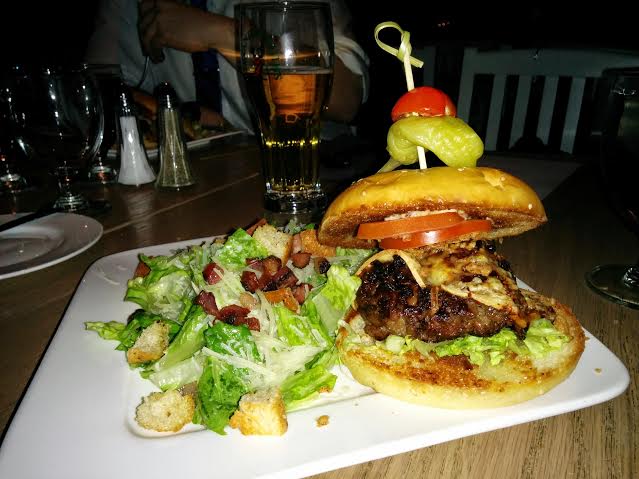
The event just kept growing and growing until it hit an impossible 125 restaurants in 2019. It was by now commonplace to see burgers (or burger-shaped things) being served by seafood restaurants, sushi bars, confectionaries, and restaurants that would never under any other circumstances serve hamburgers. Having to sift through 100+ listings of questionable merit becomes fatiguing, especially when there is so much opportunity to choose wrong.

Burger Week was no longer a celebration of gourmet hamburgers. In fact, gourmet hamburgers stopped trending years ago and have settled into the fabric of everyday life. Without the context of the gourmet burger explosion (and the corresponding Slow Food/Buy Local movements), what is Burger Week’s raison d’etre now?
Burger Week continued to grow in popularity over the years while the original context that led to its inception waned in significance. Over time, public perception shifted to viewing Burger Week primarily as a charity event.
We had entered a Brave Woke World. It was no longer enough to simply enjoy a hamburger; it must now be a virtuous act. We must partake in this gluttonous gorging to help Nova Scotians who don’t have enough food! How else will we ever show them our support?!
The event was further misconstrued when people started publically shaming restaurants that didn’t have a donation (or too small of a donation) built into their price, as if greedy restauranteurs are pocketing the money to sail their yachts around the moats of their mansions.
As if it is possible to make any profit off a $7 burger, never mind the fact that lower income people who might otherwise benefit from FEED NS might also want to participate in the event, but can’t afford to spend $17 on a goddam hamburger.
Hell, I can barely afford to spend $17 on a goddam hamburger.
If you really care about FEED NS it is much more efficient to donate here, rather than spending $80 on hamburgers in order to generate a grand total of $10 for FEED NS.
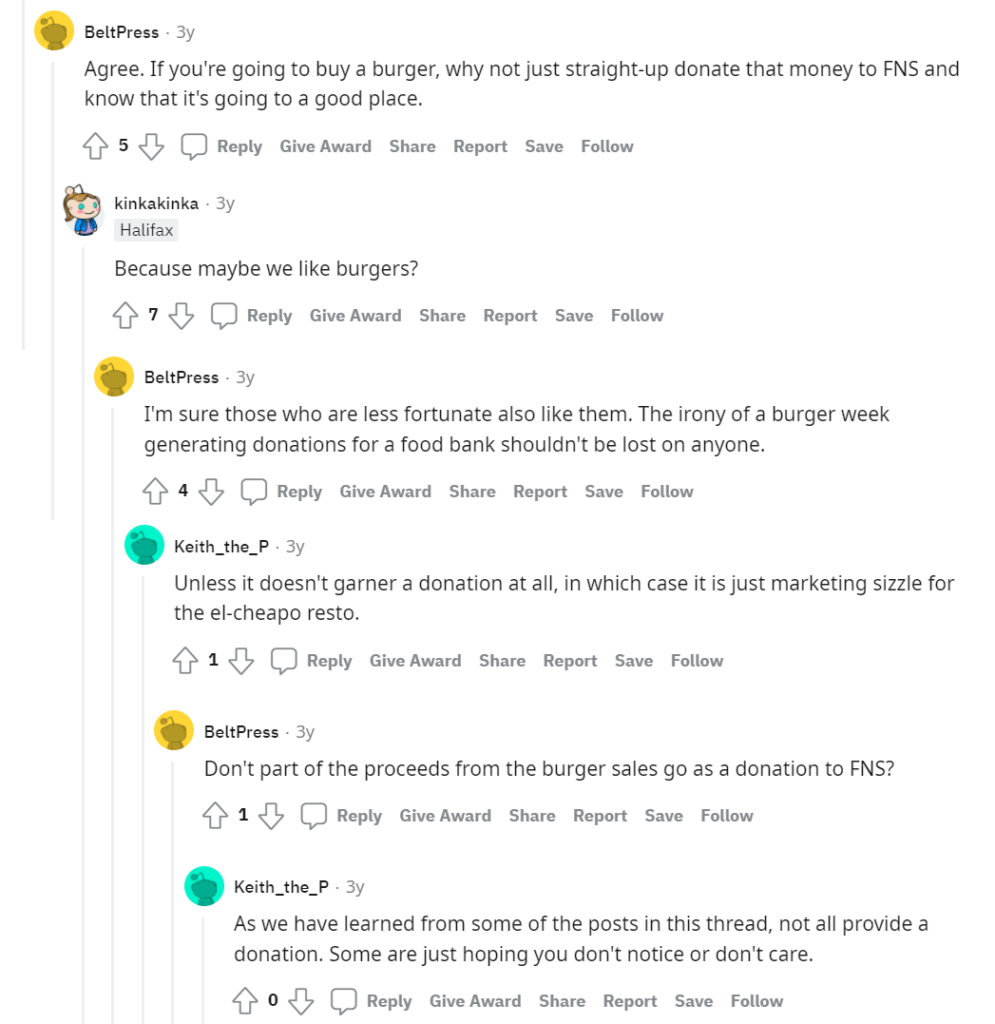
Social media is full of armchair experts, most of whom have not managed a restaurant and don’t quite understand food and labour costs, or promotions, or really anything at all. But they can certainly weigh in on matters of Virtue!
Or, you know… we could just enjoy a hamburger because we want to enjoy a hamburger.
Virtue signalling and call-out culture has denigrated the event to the point where it isn’t fun for me anymore. Perhaps the event had a flawed design from the start. Or maybe it should have just burnt out before it faded away…

Then the pandemic entered the picture, and now we are even more attuned to the rising costs and scarcity of food. We are even more (at least, superficially) supportive of our front line workers. If you’ve ever talked to staff, you’ll know that Burger Week, for a lot of them, is a much hated procession of Karens, ordering water and splitting burgers 4-ways. Now the usual week of gruelling work for a tinkle of a tip is intensified by the already taxing toil of pandemic era dining service (and the already diminished tips thanks to pandemic take-out culture). It just doesn’t feel right to demand that of them, after all that they’ve been through.
But what really emerged into my psyche in 2020/2021 are reservations about hyping up foods that aren’t doing us any favours.
Since I created Eat This Town in the summer of 2012, I have been the pizza blogger, the nacho blogger, and they who ate too many donairs and wrote a book about it. I have loved championing the comforting, working class, eat-on-the-street-while-drunk foods. I think they speak more to cultural identity than the same bougie small plates you find in every city.
But I can’t pretend that it hasn’t taken a toll on my health. People often react in surprise that I’m not 500lbs. It is because you don’t see me at the gym, or preparing the mostly healthy food I eat at home.
I’m happy to help people spend their money on good restaurants. But in 2021, with various diet-related health epidemics, a climate crisis, a crumbling health care system, and a novel virus that devastates people with comorbidities I’m not so sure how responsible it is to hype up the binge eating of caloric, carbon-emitting bombs.
The United Nations climate change report tells us to eat less meat, especially beef, to reduce greenhouse gas emissions and deforestation. The factory farms that enable us to have these $7 burgers are indefensible. But if animal welfare and the environment doesn’t concern you, then consider that just about every scary pandemic has originated from animal agriculture and that increasing antibiotic resistance in humans is promoted by their widespread use in factory farming. If there’s any kind of recipe I’m not into, it is this recipe for disaster.
I don’t think I can stand behind an event that encourages the unbridled consumption of beef in 2021. It just doesn’t sit right on the saddle.
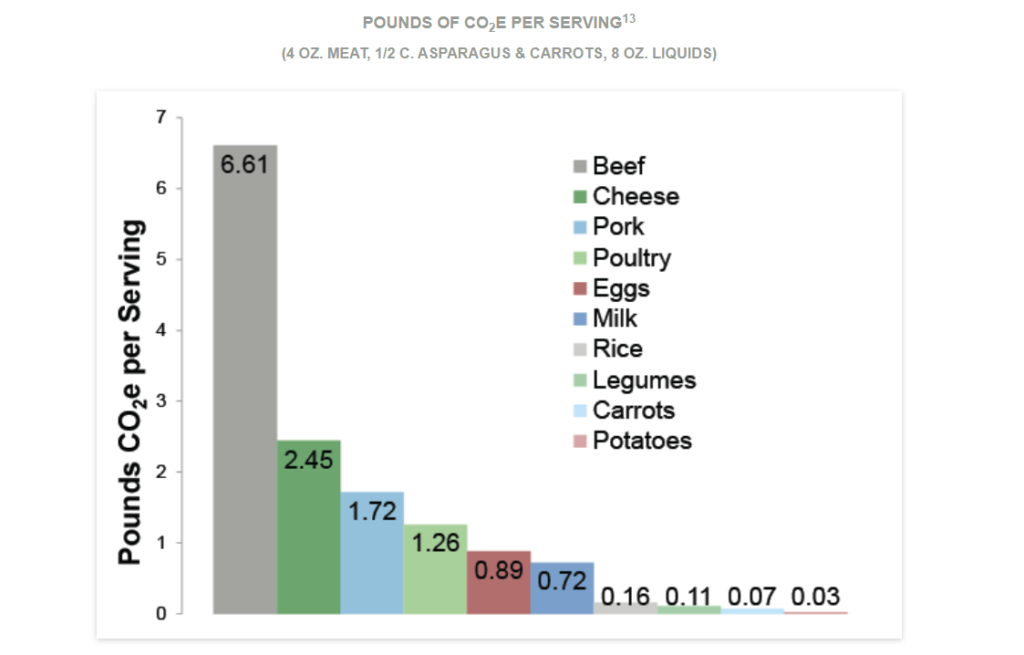
I thought about just covering the plant-based burgers, and I almost did. But you know… I’m getting tired of cramming food down my gullet all the time. The pandemic has made me more attuned to my physical and mental health, as well as my personal responsibility to my community and the world. And while it’s healthy to distance ourselves from the all the negativity once in a while, perhaps with some quick comfort food, I’m just not sure I can continue to be that kind of “influencer”.
If you’ve read this far: thank you, kind reader. Obviously this post is about more than Burger Week, and it has been cathartic to write. While I can’t see myself getting excited about any hyped up food festival or TikTok trend anytime soon, I still enjoy the occasional hamburger and I’m happy to be of service to hungry Haligonians. I’m not sure what 2022 will bring, but I will definitely be exploring more plant-based options and delving into more food history. I hope that you continue to follow me on this journey, as the world changes as do we.
11 Comments
Dimo
Even logic needs courage. So well said, thank you.
Christine Lemieux
Well said. Views change, habits change and people change, such is life. It is lovely to know you are making your health, mental and physical, your priority.
Debbie
Well written & totally understandable. Whatever 2022 brings I hope it finds you healthy & happy. You have brought much knowledge to so many and are an inspiration! May our paths cross again someday. Xoxo
Liz Smith
Completely agree with your points in this article. We stopped serving beef in 2018. If I were to start over, we would be a plant based only.
Marty Sills
Great read and I couldn’t agree with you more!
Danette Newman
I 100% agree with you. I went to a restaurant a week before Burger Week and asked if they were participating. They explained it made no sense to them. They take a portion of their sales and donate to a local charity themselves. Was very impressed
As for The Coast, I went to one restaurant who did not receive an award this year. After asking about it, they explained that after winning last year, they received a call from The Coast to ask how much they would spend for marketing with them. They replied nothing and were not nominated for anything this year. Hmmm…
Dell wickstrom
I love burgers as long as they are done by me and my grill
Tim Martin
Thanks for this, lots of perspective, very refreshing.
Linda Garber
You make some good points. I found this past year, the offerings were not appealing, seemed more for hype than eating.
On a separate note, every time you refer to your spouse as “the wife”, it makes me cringe, as I consider it derogatory. Perhaps it is time to shut that down too.
The Wife
I would kindly ask that you not police the language and affectionate terms my wife and I use with each other.
E.D
Good piece. Love the alliteration and well thought out message.